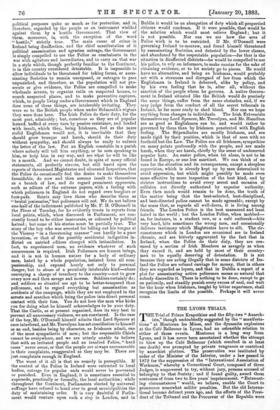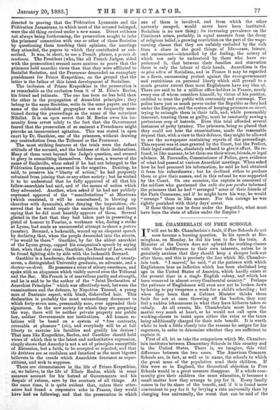THE LYONS TRIALS. T HE Trial of Prince Krapotkine and the
fifty-two " Anarch- ists," though undoubtedly suggested by the " manifesta- tions" at Montceau les Mines, and the dynamite explosions at the Café Bellecour in Lyons, had no ostensible relation to either of those events. Montceau is a long way from Lyons, and it has never been ascertained whether the attempt to blow up the Cafe Bellecour (which resulted in at least one death) was prompted by private vengeance or contrived by anarchist plotters. The prosecution was instituted by order of the Minister of the Interior, under a law passed in 1872 for the suppression of the "International Association of Workmen," whereby a Correctional Court, composed of three Judges, is empowered to try, without jury, persons accused of belonging to that Society ; and if found guilty, award them sentences of from two to five years' imprisonment. "Extenuat- ing circumstances " would, we believe, enable the Court to pronounce somewhat milder penalties. But the old Interna- tional became defunct years ago, and the efforts of the Presi- dent of the Tribunal and the Procureur of the Republic were directed to proving that the Federation Lyonnaise and the Federation Jurassienne, to which most of the accused belonged, were the old thing revived under a new name. Direct evidence not always being forthcoming, the prosecution sought to infer the prisoners' connection with one or other of these Societies by questioning them touching their opinions, the meetings they attended, the papers to which they contributed or sub- scribed. It was, in short, to use a French phrase, a proces de tendance. The President (who, like all French Judges, sided with the prosecution) seemed more anxious to prove that the prisoners held anarchic views than that they were affiliated to Socialist Societies, and the Procureur demanded an exemplary punishment for Prince Krapotkine, on the ground that the latter is the father of this latest development of Socialism.
The inclusion of Prince Krapotkine in the _prosecution is as remarkable as the exclusion from it of M. Eliseo Reclus, his friend and intimate. The one has been no less bold than the other in the propagation of Anarchist principles ; they belong to the same Societies, write in the same papers, and the name of the celebrated geographer was as frequently men- tioned during the proceedings as the name of the notorious Nihilist. It is an open secret that M. Reclus owes his im- munity from arrest solely to the fact that the Government feared that the prosecution of so eminent a Frenchman might provoke an inconvenient agitation. • This was stated in open court by Dr. Gauthier, one of the prisoners, without drawing any contradiction from the Tribunal or the Procureur.
The most striking features at the trials were the defiant attitude of the accused, and the boldness of their declarations. Many of them went beyond the Judge's question, and seemed to glory in committing themselves. One man, a weaver of the name of Saulaville, when asked if he had not belonged to the Federation Lyonnaise, answered in the negative. Desiring, he said, to preserve his " liberty of action," he had purposely refrained from joining that or any other society ; but he wished it to be understood that he fully approved of all that his fellow-anarchists had said, and of the means of action which they advocated. Another, when asked if he had not publicly expressed approval of the " manifestations " at Montceau (which consisted, it will be remembered, in blowing up churches with dynamite), after denying the imputation, ob- served that he would repair the omission by then and there saying that he did most heartily approve of them. Several gloried in the fact that they had taken part in presenting a pistol of honour to Fourier, a workman who, during a strike at Lyons, had made an unsuccessful attempt to shoot a patron (master). Bernard, a locksmith, wound up an eloquent speech by declaring that, when the people descended into the streets, "he would be there." Gauthier, by far the ablest anarchist of the Lyons group, capped his companion's speech by saying that, when that day came, Gauthier, the Doctor of Law, would be found fighting side by side with the locksmith Bernard.
Gauthier is a handsome, dark-complexioned man, of twenty- seven, a distinguished University graduate, an advocate, and a docteur-en-droit. He possesses a voice of silvery sweetness, and spoke with an eloquence which visibly moved even the Tribunal and the Bar. His French is of marvellous purity and strength, and he is said to be the author of the " Joint Declaration of Anarchist Principles " which was effectively-read, between the examinations and the defence, by Napoleon Tissaud, a young man of Dantonic aspect, with black, dishevelled hair. This declaration. is probably the most extraordinary document to which forty-seven men, presumably sane, ever appended their signatures. In the new society for which they are preparing the way, there will be neither private property nor public law, neither Governments nor institutions. All human re- lations will be based on a system of " free contracts, revocable at pleasure" (sic), and everybody will be at full liberty to exercise his faculties and gratify his desires That men like Krapotkine, Reclus, and Gauthier should hold views of which this is the latest and authoritative expression, simply shows that Anarchy is not a set of principles susceptible of discussion, but a faith, to be accepted or rejected, and that its devOtees are as credulous and fanatical as the most bigoted believes in the creeds which Anarchists denounce as super- stitiOnO, and seek to suppress. There are circumstances in the life of Prince Krapotkine, as, we believe, in the life of Elisee Reclus, which in some measure account for his hatred of Governments and his despair of reform, save by the overturn of all things. At the same time, it is quite evident that, unless their utter- ances had found a responsive echo in France, they would have had ne following, and that the prosecution in which one of them is involved, and from which the other narrowly escaped, would never have been instituted. Socialism is no new thing ; its increasing prevalence on the Continent arises, probably, in equal measure from the decay of religious belief, a growing conviction on the part of the wage- earning classes that they are unfairly excluded by the rich from a share in the good things of life—ease, leisure, and amusement—intensified by the feeling, the misery of which can only be understood by those who have ex- perienced it, that between their families and starvation there is only the labour of their hands. Anarchism is the ne plus ultra of Socialism, and in France it may be regarded as a fierce, unreasoning protest against the over-government and restrictions on personal liberty which still prevail to a much greater extent than most Englishmen have any idea of. There are said to be a million office-holders in France, nearly every one of whom considers himself, by virtue of his position, entitled to treat the public with contumely and contempt. The police have just as much power under the Republic as they had under the Empire, and the system of keeping prisoners au secret, trying to entangle them in their talk, and, while presumably innocent, treating them as guilty, must be constantly sowing a portentous crop of hatreds. Even this trial afforded several instances of petty tyranny. The prisoners, being so placed that they could not hear the examinations, made the reasonable request that, with a view to their defence, they might be allo wed to see the newspapers containing reports of the proceedings. This request was at once granted by the Court, but the Prefect, their legal custodian, absolutely refused to give it effect. He re- fused, in like manner, to let them see their wives, friends, or legal advisers. M. Perrandin, Commissioner of Police, gave evidence of what had passed at various Anarchist meetings. When asked how he had procured his information, he said he had obtained it from his subordinates ; but he declined either to produce them or give their names, and in this refusal he was supported by the Court. On one occasion, the captain in command of the soldiers who garrisoned the mile des pas perdus informed the prisoners that he had " arranged " some of their friends of the Paris Commune, and if he might have his way, he would " arrange " them in like manner. For this outrage he was rightly punished with thirty days' arrest.
If these things can be done under the Republic, what must have been the state of affairs under the Empire ?



































 Previous page
Previous page